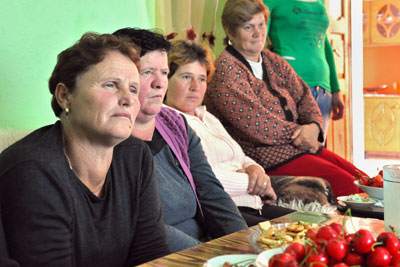Teamwork fosters business growth and women’s economic empowerment in Albania
With the support of UN Women, an economic empowerment project in Albania is helping rural women cultivate their business skills and increase their income by forming cooperatives.Date:

On the fertile and lush fields of the Dibra region, one of the poorest in Albania, located on the north-east border of the former Yugoslav Republic of Macedonia, 47-year-old Emrie Lata and her husband collect their daily harvest. Emrie has worked on this land most of her life, collecting forest fruits, vegetables and medicinal herbs, which she sells for a profit. Her husband is unemployed and Emrie has to support the family, including their three sons. One of them has emigrated abroad in order to help the family, but his income alone is not enough.
Now, thanks to a new initiative that provides business skills and support to rural women in Albania, Emrie’s small agricultural business is becoming profitable and has increased her family’s income. Implemented since October 2013 by Albania’s Institute for Democracy and Mediation and the local organization Agritra Vision, with support from UN Women and the Swedish Government, the "Empowering Women through Economic Cluster Development” project aims to bring rural women farmers together to sell their products in cooperative associations and other self-organized groups.
The project teaches women like Emrie concrete skills—how to divide roles effectively within a group; increase productivity and reduce costs; network with donors and organizations; access grants and loans; and improve their accounting and marketing skills.
“My life has changed a lot,” says Emrie. “Before I didn’t know how to collect and dry the product without damaging it. But now I have the knowledge, which increased the quality of the product.”
Emrie is one of 20 women farmers growing small fruits and herbs in the communes of Melan and Tomin in the Dibra region, who together have created the Agricultural Cooperative Association “Staraveci Products.” With support from the economic clusters project, the women have developed the cooperative’s business strategy, learned about marketing, price-setting, storage and delivery, and how to label and package their products in order to increase their market value.
“With the knowledge and support that we received, we can participate in local and regional fairs now,” says Shpresa Tomcini, another beneficiary of the project. “I’ve been able to support my family through this project.”
For most of these women, their labour in the agricultural sector is the only source of revenue for their families. However, without the knowledge, skills and infrastructure to process and store their products — and a business model to access funding and the markets — their growth, negotiating power and profitability is hampered.
“Getting together as a group is an opportunity for these women to support each other in accessing the markets. Individually, it’s impossible,” says Majlinda Hoxha, Co-founder of the Dibra cluster and Director of Agritra Vision. She says the goal of the project is to teach women and other local stakeholders about the importance of teamwork to their economic success. The women can now access more markets, even beyond the city centre.
“Before they were collecting for distributors, but they had no power to negotiate,” Hoxha adds. “Having registered as a small business unit now, it’s easier to sign contracts with collection companies that buy the products.”
Shpresa says the project has made her feel stronger because she can provide for her family, but also because the community has come to respect the work the women are doing.
According to David Saunders, UN Women Representative in Albania, the project in Dibra “will contribute to women’s economic empowerment and improve the quality of life of their families and local communities” and it has become a model to other areas of the country where women face similar barriers to economic empowerment.
“There are many other women that want to participate in a similar project as ours because they’ve seen our results,” Shpresa says.
As for the Dibra cluster members, their plans for the next phase of business growth are already set. They want to establish a multi-functional warehouse to expand their business.